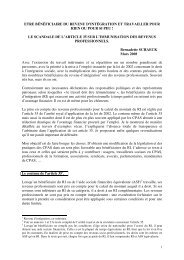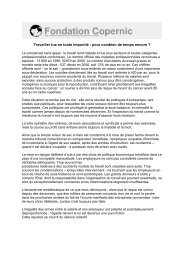Awra Amba RJ 300612 EN - Contacter un comité local d'Attac
Awra Amba RJ 300612 EN - Contacter un comité local d'Attac
Awra Amba RJ 300612 EN - Contacter un comité local d'Attac
Create successful ePaper yourself
Turn your PDF publications into a flip-book with our unique Google optimized e-Paper software.
3. Values and principles<br />
in an atmosphere of mutual respect (Ya08/68).<br />
3.1. Honesty<br />
"I saw people hurting, killing, and stealing each other. I knew that we, as persons, were doing<br />
something to other that we would hate if it would happen to us. How do we differ from animals if we<br />
don’t think and behave humanly?" said Zumra according to Habtamu (2009).<br />
Honesty is one of the main values of the <strong>Awra</strong> <strong>Amba</strong> comm<strong>un</strong>ity. Stealing and lying have no place<br />
in <strong>Awra</strong> <strong>Amba</strong>, as begging: they are absolute rules (At05/50 & 66; Ya08/74). Ennat-Ayighegne<br />
Thasew, member of the Chamber of the social justice of the kebele, envies their habit of telling the<br />
truth and emphasizes they do hate straight lies and strongly condemn theft (Me09/71). There is no<br />
theft in <strong>Awra</strong> <strong>Amba</strong>, and children do not beg – almost <strong>un</strong>imaginable in a co<strong>un</strong>try where begging is<br />
widespread (Calvino, 2008). Nevertheless, houses are all locked in order to be protected against<br />
outsiders (many people from the neighbouring villages come to <strong>Awra</strong> <strong>Amba</strong> for the mill, the shop or<br />
the café) (Jo10b).<br />
3.2. Equality<br />
<strong>Awra</strong> <strong>Amba</strong> is above all known for its principle of gender equality. But equality is claimed not only<br />
between men and women, but also between adults and children, and more generally between human<br />
beings.<br />
3.2.1. Gender equality<br />
While sex differences are physical, gender differences are socially constructed. The latter are social<br />
or cultural interpretations of sex differences, the roles assigned to or expected from each sex in a<br />
specific society.<br />
In Ethiopia, even the roles assigned to each sex vary from a region to another, girls are educated<br />
during their childhood to be obedient, submissive, shy, virginal and imaginative 2 . Women are then<br />
suffering from socio-cultural and economic discrimination and have fewer opport<strong>un</strong>ities compared to<br />
men for personal growth, education and employment (Ya08/37 & 77). Gender and age are the chief<br />
parameters concerning work: baking injera, fetching water are left only to females; ploughing,<br />
h<strong>un</strong>ting, slaughtering are works left only to males (Yi07/58). Women and the yo<strong>un</strong>gest do most of<br />
the work. Among Amhara peasants, the wife is too busy in the morning to sit down for a regular<br />
breakfast; she has breakfast while doing her various works: preparing and baking injera, preparing<br />
the <strong>local</strong> beer (tela), spinning cotton, collecting d<strong>un</strong>g for fuel, sweeping rubbish of the floor, carrying<br />
water from the spring, weaving straw baskets of mats. If the peasant is working in a distant farm<br />
field, his wife carries l<strong>un</strong>ch out to him. Otherwise, she risks being beaten with a stick. If he is not far<br />
away he come for l<strong>un</strong>ch, they eat together at home. After dinner, the peasant asks often his wife or<br />
his children to wash his feet, while other wash themselves (At05/45). In Ethiopia 15 years ago, a<br />
husband was still authorized to “discipline” his wife (France 24, 2009). The woman's schedule is<br />
today only lightened, not radically altered. Except for a possible trip to church with her husband<br />
S<strong>un</strong>day morning before breakfast, woman's hours are still confining to the home compo<strong>un</strong>ds and its<br />
obligations. In the wealthier families, where one or several servants are in charge of the hardest<br />
works, woman must still be passive and reserved. Women are beaten as a matter of cause for<br />
mistakes in their work (At05/45-46).<br />
The status women enjoyed in traditional Amhara society is therefore to be at home and her main<br />
2 Sentence attributed to (Ministry of Economic Development and Cooperation – MEDaC, 1999) by<br />
Ya08/76, who does not give the reference.<br />
35 / 85

















